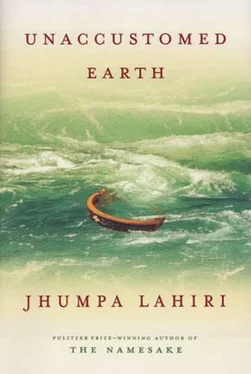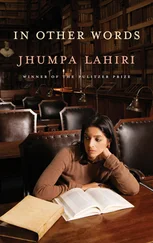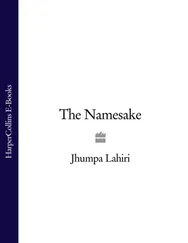Rupa sat behind Chitra, massaging her mother's scalp and plucking out a few gray hairs while Chitra leaned back and closed her eyes. I gathered that this was a regular routine, something that took place without the need for instructions or comment. I sat up and watched, imagining the rest of Chitra's hair turning gray one day, imagining her growing into an old woman alongside my father the way my mother was meant to. That thought made me conscious, formally, of my hatred of her. As if aware of what I was thinking, Chitra opened her eyes and looked at me, embarrassed, quickly gathering her hair around her hand. She got up and went to the kitchen, returning a few minutes later with a pot of tea and cups of Ovaltine on a tray. There were two types of chanachur in cereal bowls, and on a small plate, a donut cut into four pieces.
"Now will you take tea?" she asked me.
I accepted, lifting from the tray the cup she'd already prepared, with separately heated milk and too much sugar.
"This is from Haldiram," she said, passing me one of the cer-eral bowls. "Best in all Calcutta."
"No, thank you."
"This room is cold," she continued. "The wind comes straight through the glass. Why aren't there curtains?" "It would spoil the view," I said.
"The steps are also slippery." She pointed to the floating staircase leading to the second floor. "And there is no railing. I am afraid Rupa and Piu will fall."
I turned to look at the thick pieces of wood arranged like empty shelves ascending the white walls. Even at her weakest, my mother had gone up and down them without protest.
"Why is there no railing?" Chitra repeated.
"Because we liked it that way," I said, aware that I sounded pedantic. "Because that's what makes it beautiful."
We had nothing else to say to one another. We sat and watched one program and then the next as Chitra worked on something with a crochet hook, and I wondered how I was going to survive the next four weeks in her company. We were all waiting for my father, waiting for him to return and explain, if only by his presence, why we were sitting together drinking tea. When he did, he asked me to give him a hand outside; there was a Christmas tree tied to the roof of his car. "I would have gone tomorrow," I said, helping him to untie the rope that held it in place. I was without gloves, a fact that made the task, in the frigid evening air, both easy and painful. We dragged the tree inside and propped it in one corner of the living room, next to the high stone fireplace. Chitra and the girls gathered around.
"But it's just like all the other trees outside," Chitra said, pointing through the glass wall.
"It's different, actually." I said. "On the property we have pine trees. This is a spruce."
Somewhere in the basement there was a box, my father said, containing the stand, the lights, ornaments to hang from the branches. They were from our first winter in the house, the last
Christmas my mother celebrated, and I was surprised my father hadn't tossed them out. He asked me to go down and look for the box. Our basement lacked the sedimented clutter of most, given that we'd lived in the house only a handful of years and that for most of that time my mother had been dead and I had been away at college. There had been no period of haphazard accumulation, only events that had caused things to be taken away. Still, there were a number of boxes stacked up against the walls, empty ones that once contained the television and the stereo speakers, others still taped up, full of inessential items my parents had had shipped from Bombay and never bothered to unpack.
I slit the tape with my car key and lifted the flaps of a few of the boxes. One contained old engineering books of my father's. Another had a dinner set wrapped in pages of The Times of India, plates I had eaten off for years but forgotten until now, with a pattern of small orange diamonds around the rim. I found my enlarger, tongs, a set of trays, and old bottles of fixer for the darkroom I'd set up during my last year of high school. There were times my mother came down and kept me company, sitting quietly in the blackness as I struggled to load film onto the developing reel. Together we would breathe in the chemical smells, their corrosiveness, from which my hands were protected by rubber gloves, nothing compared to what was taking place inside her body. She would keep time for me with her watch, familiarizing herself with the process enough to be able to tell me when to pour the series of fluids in and out of the processing tank, both of us knowing that I'd have to buy a timer, eventually. "It must be something like this," she said once in that perfectly dark, silent, sealed-up space, and I understood without her saying so that she was imagining what it might be like to be dead. "This is how I want to think of it."
The box I was looking for was labeled "x-mas" in my mother's hand, not on the side so that it was easily identifiable, but in a corner on top. I had no sentimental attachment to the items inside, and yet I didn't want to see them. The thought of Chitra going through the box, watching her sift through everything, upset me just as it had upset me, throughout the day, to watch her handle the cutlery, the teakettle, at one point to hold the telephone and speak with my father to learn that he was on his way home. When my father had tried to remove the signs of my mother from the house I blamed him for being excessive, but now I blamed him for not having done enough.
"I can't find it," I said, after returning upstairs. My father did not press the issue, did not insist on going down and looking for it himself. He behaved differently around Chitra, was more accepting of the minor defeats of life. I offered to go to a drugstore and buy what we needed, glad to have another reason to leave the house. When I came back my father and I trimmed the tree together, Chitra and the girls watching us from the sectional. We placed the tree in the stand and tightened the screws and draped lights over the branches. There was nothing personal or idiosyncratic to put on it, just a box of sapphire-blue balls, so that it looked less like a tree in someone's home and more like one in the corner of a bank or an office lobby. But Rupa and Piu were delighted, exclaiming that they'd never seen anything more beautiful. My father went upstairs and returned with a shopping bag full of gifts. They'd all been wrapped at whatever store he bought them in, the same green-and-gold paper professionally taped and tied. He distributed them under the tree, eight boxes altogether. "Two for each of you," he said to no one in particular. Rupa and Piu got up and went to look at them then, excited to find their names written on the tags.
"Can we open them?" Piu asked Chitra, Chitra who did not know the answer.
"Not until Christmas morning," I said. "Until then you can just look. And maybe shake them a little."
"So lovely," Chitra said, impressed now that the tree had been trimmed.
"Kaushik, what about a picture?" my father suggested.
I shook my head. I had left my camera, my father's old Yashica, at school.
"But you always have it with you." That look of irritated disappointment, the one that had appeared the day my mother died and was missing now that he'd married Chitra, passed briefly across my father's face.
"I forgot it," I said. It was true, I did always have the camera with me. Even on quiet weekends when I came home and my father and I saw no one I would bring it, taking it with me on walks. This time I had left it behind, knowing that I would not want to document anything.
"I don't understand," my father said.
"Neither do I," I replied. "You haven't wanted a picture of anything in years." "That's not true." "It is."
We were stating facts and at the same time arguing, an argument whose depths only he and I could fully comprehend. I went to the kitchen to pour myself a drink, bringing it with me to the dining table when Chitra announced, a few minutes later, that dinner was ready. No one said anything during the meal. When we were done eating, Chitra cleared all the plates and took them into the kitchen, just as she had the night before, allowing my father and me to relax after dinner in a way that we'd never been able to during the last years of my mother's life. We no longer had to assume the responsibility of scraping the plates and loading the dishwasher so that my mother could rest. I sat finishing my drink, and Rupa and Piu slithered out of their seats and returned to the sectional to watch more television. My father got up and followed them, settling into his recliner with the newspaper. He opened it to a large ad for Lechmere that featured cameras for sale, circling things with a ballpoint pen.
Читать дальше












